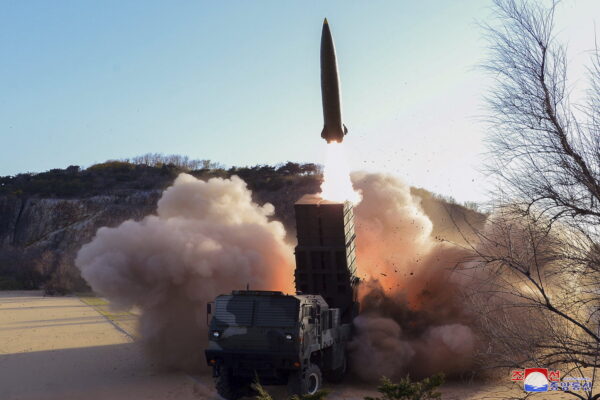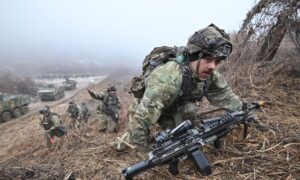The United States and South Korea agreed on Tuesday to scale up their joint military exercises in a bid to counter North Korea’s military escalation.
In a joint statement, U.S. defense secretary Lloyd Austin and South Korean defense minister Lee Jong-sup condemned North Korea’s continued provocations and vowed to take “a strong stance” against any further military action.
The two allies planned to hold the deterrence strategy committee tabletop exercise in February “to facilitate alliance discussions on deterrence and response options” to deal with the North Korean nuclear threat, according to the statement.
“We will further reinforce the alliance capability and posture and the combined defense through expanded execution of field training exercises and large-scale combined joint fires demonstration,” Lee said at a joint press conference.
It was great seeing my 🇰🇷 ROK counterpart, Minister Lee Jong-Sup to discuss our common commitment to security in the region & around the world. The U.S. will continue to stand shoulder-to-shoulder with the ROK, rooted in our shared values of democracy, freedom, & the rule of law. pic.twitter.com/3a8DpxoVVP
— Secretary of Defense Lloyd J. Austin III (@SecDef) January 31, 2023
There are about 28,500 American troops stationed in South Korea, making it one of the largest U.S. troop deployments around the world. Austin said the U.S. fifth-generation aircraft—F-22s and F-35s—and a Ronald Reagan carrier strike group would participate in the joint drills.
“We will do a number of tabletop exercises to ensure that we’re seeing things eye-to-eye, which we do anyway, but we want to make sure that no stone is left unturned,” he said.
Austin reaffirmed the United States’ “ironclad” commitment to defending its Asian ally with “the full range of U.S. defense capabilities, including our conventional, nuclear, and missile defense capabilities.”
“You heard us say that a number of times, but that’s just not a slogan; it is what we’re all about. That commitment is ironclad, and our extended deterrence is at the heart of that commitment,” he remarked.
The two nations held their largest combined military drills—known as Ulchi Freedom Shield—in August 2022, the first after years of downsizing their annual drills to facilitate denuclearization talks with North Korea in 2019 and also due to COVID-19 concerns.
Cooperation With Japan
The two leaders also agreed to strengthen trilateral security cooperation with Japan and to facilitate the trilateral sharing of missile warning data following a summit agreement between the three nations last year.
“To this end, they agreed to hold Defense Trilateral Talks at the earliest opportunity to discuss concrete measures on how to strengthen security cooperation among the three nations,” the joint statement reads.
In November 2022, the three nations’ leaders held a trilateral meeting in Cambodia and vowed “a strong and resolute response” from the international community if North Korea launched a nuclear attack.
The U.S. State Department earlier said that the Biden administration sought to “revitalize” the trilateral format because they believed that the challenges in the Indo-Pacific would benefit from “a seamless and unified trilateral approach.”

North Korea fired an unprecedented number of missiles last year, one of which reportedly flew over Japan and triggered alerts warning citizens in the Hokkaido and Aomori prefectures to take shelter.
Earlier this year, South Korean President Yoon Suk-yeol said the U.S. strategy of providing a “nuclear umbrella” or “extended deterrence” to South Korea is not reassuring enough to guarantee public safety now that North Korea has developed its own nuclear weapons.
“In the past, the concept of a nuclear umbrella or extended deterrence was preparation against the Soviet Union and China before North Korea developed nuclear weapons, and a way of the U.S. telling us not to worry because it will take care of everything,” he said.
“Now, it is difficult to convince our people with just that. The U.S. government understands this to some degree,” Yoon added.
In August 2022, Yoon offered North Korea economic benefits in exchange for denuclearization steps, but the offer was rejected by the North Korean regime. North Korean leader Kim Jong-un said that there will be no denuclearization talks, negotiations, or “bargaining chips” in that process.
North Korea approved a law in September 2022 allowing it to conduct a nuclear strike “automatically” against any “hostile forces” posing an imminent threat. Kim vowed that his country will “never give up nuclear weapons,” even if North Korea is subjected to “100 years of sanctions.”

